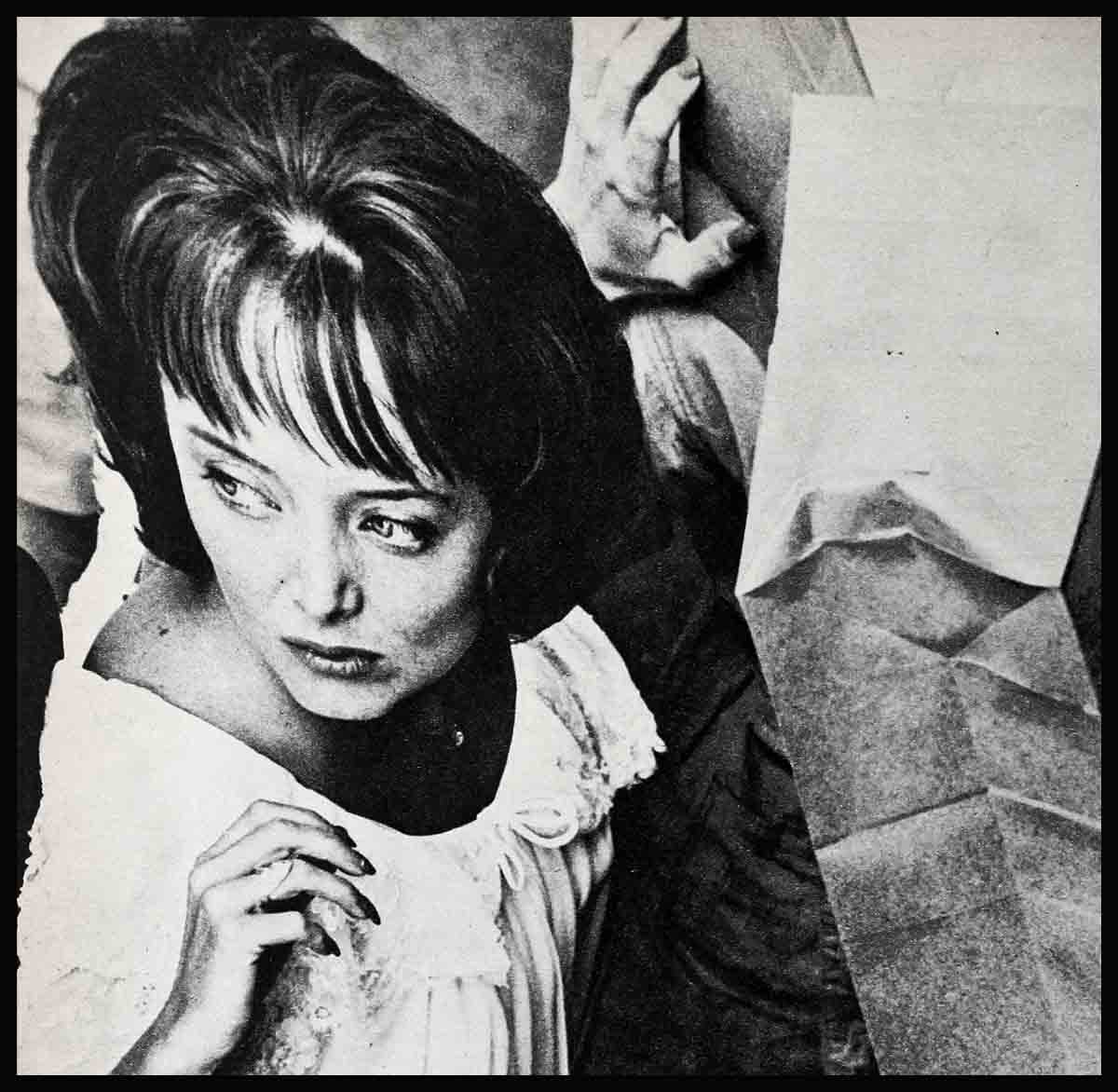
What Happens When A Star Sleeps
What do they dream? What do their dream mean? To find out, we take you into the secret world of:
Carolyn Jones
Doug McClure
Frankie Avalon
Bobby Rydell
Dodie Stevens
Bob Conrad
Roger Smith
Diane McBain
Sal Mineo
and Fabian!
There’s a song which says, “A dream is a wish your heart makes.” And, according to psychologists, that song is very close to the truth. A dream, experts say, is a picture of what the mind is thinking. The noted psychologist Calvin S. Hall tells us that the dreamer writes, directs, produces and of course stars in his own dreams. With the assistance of text books by Dr. Hall, Sigmund Freud and Carl Jung we have had fun interpreting the recurring dreams of ten Hollywood stars. We do not profess to be experts, but perhaps you’ll find some interpretive clues to your very own dreams when you compare them with the dreams of these stars. Now, to find out what happens when a star sleeps, we’ll take you into their very secret world!
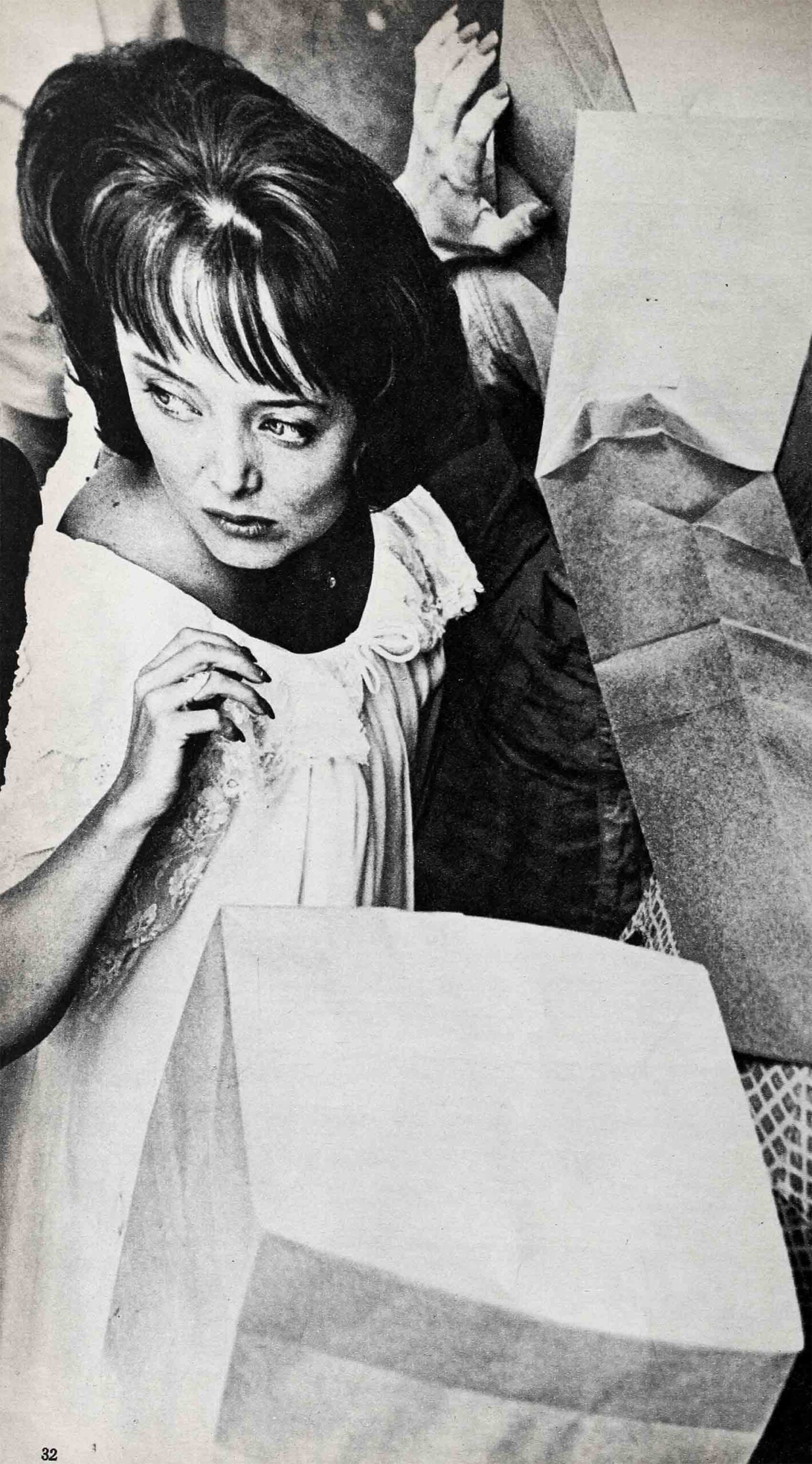
Carolyn Jones’ dream: ‘‘I am walking amongst a crowd of people. Everyone except me has a paper sack over his head. I try my best to attract their attention. I want them to notice me—but they don’t, they continue walking with the sacks over their heads. The more I call and yell for recognition, the more I realize I’m completely alone—even if I’m surrounded by these teeming hordes. Then, just when I think I can’t stand it any longer, I wake up.”
THEORY: As a youngster in Amarillo, Texas, Carolyn Jones suffered acute asthmatic attacks. When one of these attacks occurred during sleep, she dreamed of suffocating as a warning to wake up.
Now Carolyn dreams of being free, while others walk around with sacks over their heads, indicating a woman who has overcome her fear of suffocation through positive thinking.
In her dream she shouts for the world to notice her, but even though she is free and able to cope with her own personal problems, the others pay no attention. Therefore, we know that being loved and accepted by others is especially important to Carolyn and it is this need that accelerates her drive.
Carolyn’s dream is one of a person who fears failure through self-error. It indicates a personality who will continue working at her craft and self-development at high speed throughout her life, because she never feels that she has reached her full potential.
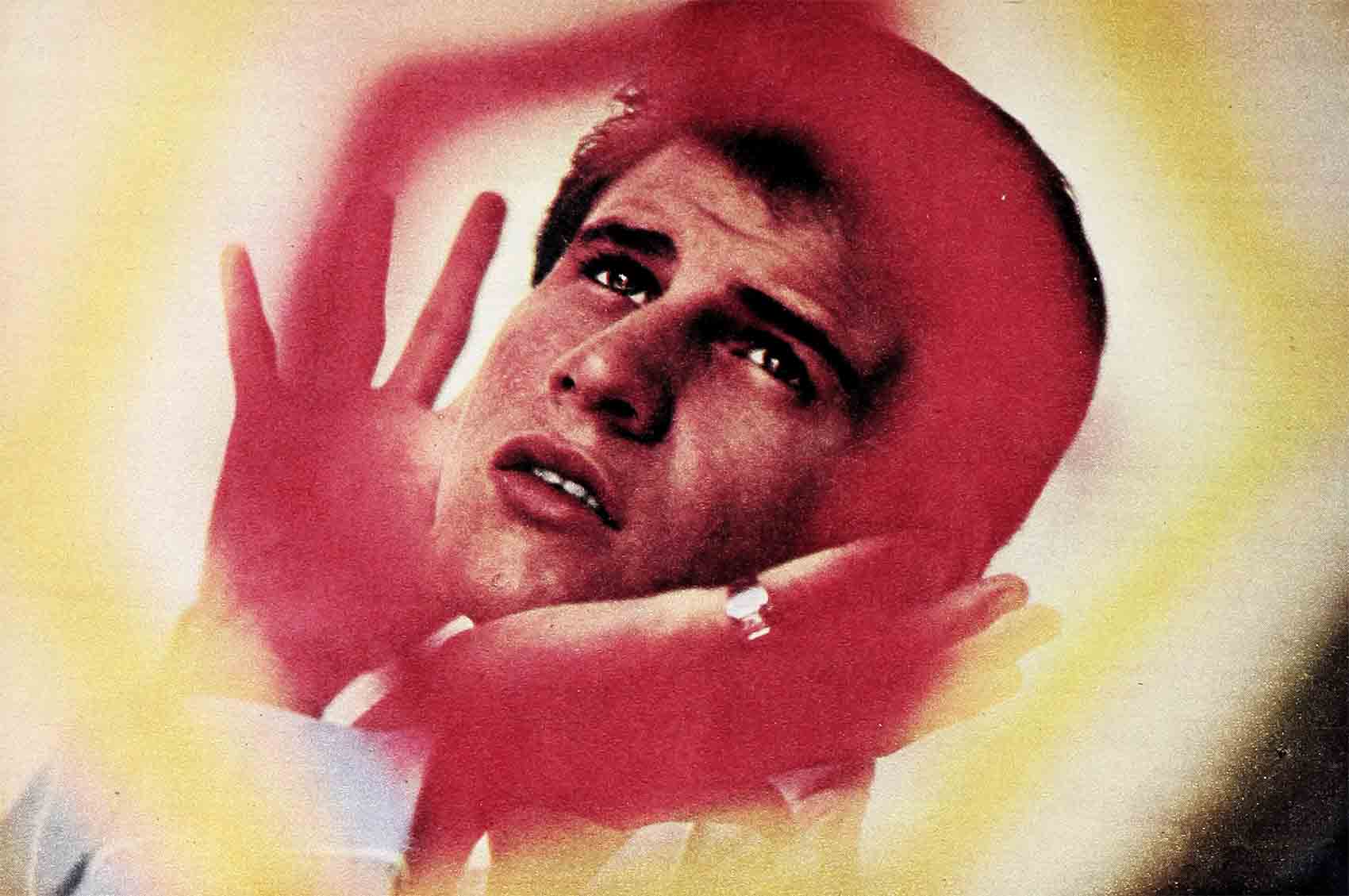
BOBBY RYDELL’S DREAM: “Wearing pajamas, I’m standing alone in space. I look up and see a gigantic wheel—like a roulette wheel—which constantly changes colors as it spins around and around. As it fades away, I suddenly see hundreds of squares, rectangles and circles floating in the air. They seem to be suspended in space and are way above me as I stand gazing up at them. Then they become larger and larger and start chasing me.
“Two large squares, as tall as hundred-story buildings, pin me in a corner of nothingness. Just as these squares start to squeeze me to death, they fade away and I find myself falling down a steep cliff. I wake up before I hit the bottom.
“I’ve had this dream every time I’ve been ill. The first time when I was eight, again when I was twelve and more recently at the age of seventeen.”
THEORY: Bobby’s is an anxiety dream. It is common for dreamers to be concerned with their inner conflicts when ill.
When we fall in childhood, there is usually someone to pick us up. Consequently, as children or adults we often dream of falling because we want freedom—but we never hit bottom, for we know that we can rely on some tangible thing, usually a person, to help us with our problems.
However, anxiety dreams don’t always take a tangible form. For instance, Bobby dreams in symbols. He sees figures which he can only identify as squares, rectangles and circles. These shapes merely symbolize conflict. The outstanding factor is that he sees them larger than he is.
This reveals Bobby’s biggest conflict within himself—he wants to grow up. be accepted as an adult and take on responsibility. Yet, just when the problem seems so immense that he can’t cope with it. he finds someone or something familiar to help him out of the situation. The whole dream indicates a young man’s drive for maturity.
The fact that he hasn’t had the dream since he was seventeen shows that he may have possibly learned to reckon with this conflict which was so evident during his pre-teen and teen years.
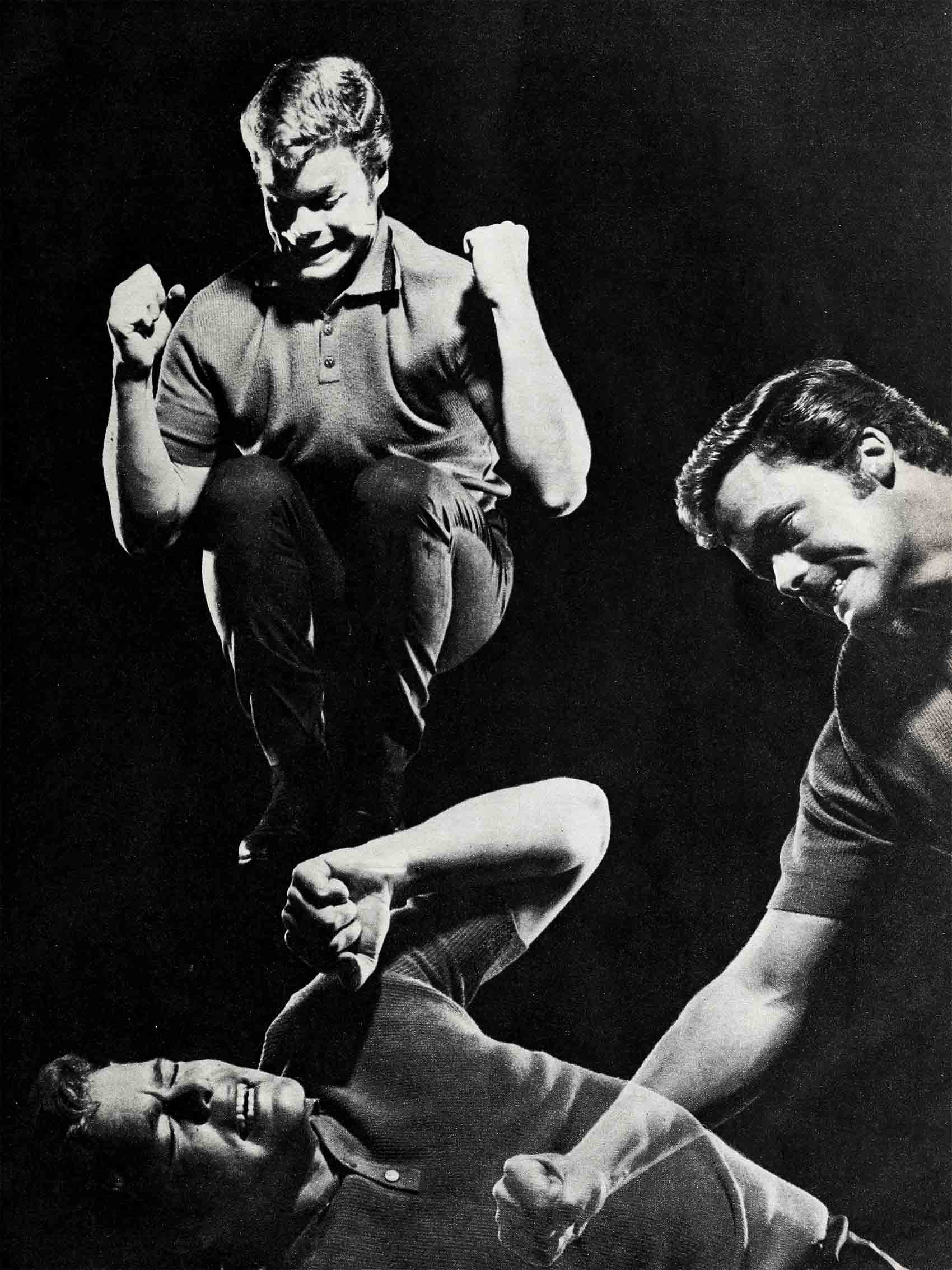
DOUG McCLURE’S DREAM: “I don’t have a specific recurring dream, but I do have a series of dreams depicting the same general thing. In those dreams, I’m always fighting someone. That someone is always a man—but I can’t see his face. Sometimes we are in an arena in boxing trunks. Other times we are fighting in an alley or on a busy street. Often, a crowd gathers to watch us. but I can’t make out the faces of these people either. And once, the man I fought and knocked down was me.
“My dreams are always in black and white and no one is ever hurt. I am engaged in furious battle but, except for that one time, I can’t knock the other man down nor can he hurt me. Just as I begin to realize that no harm will come to either of us, the dream ends.”
THEORY: Doug is always fighting, but he doesn’t see the face of his opponents. Therefore, his human foes are probably symbolic of his fight against life. Since his human antagonists symbolize life, humanity is automatically included—and here we find that Doug worries about hurting his fellow man.
He is knocked about but refuses to fall down—except in the one instance when he fought himself. He strikes back but doesn’t want to harm anyone.
The inner picture of Doug McClure, then, is of an ambitious gentleman whose greatest goal is to become a success without hurting people along the way. At the same time, he doesn’t want anyone stepping on him. He continually wonders how this balance of ideals can be accomplished.
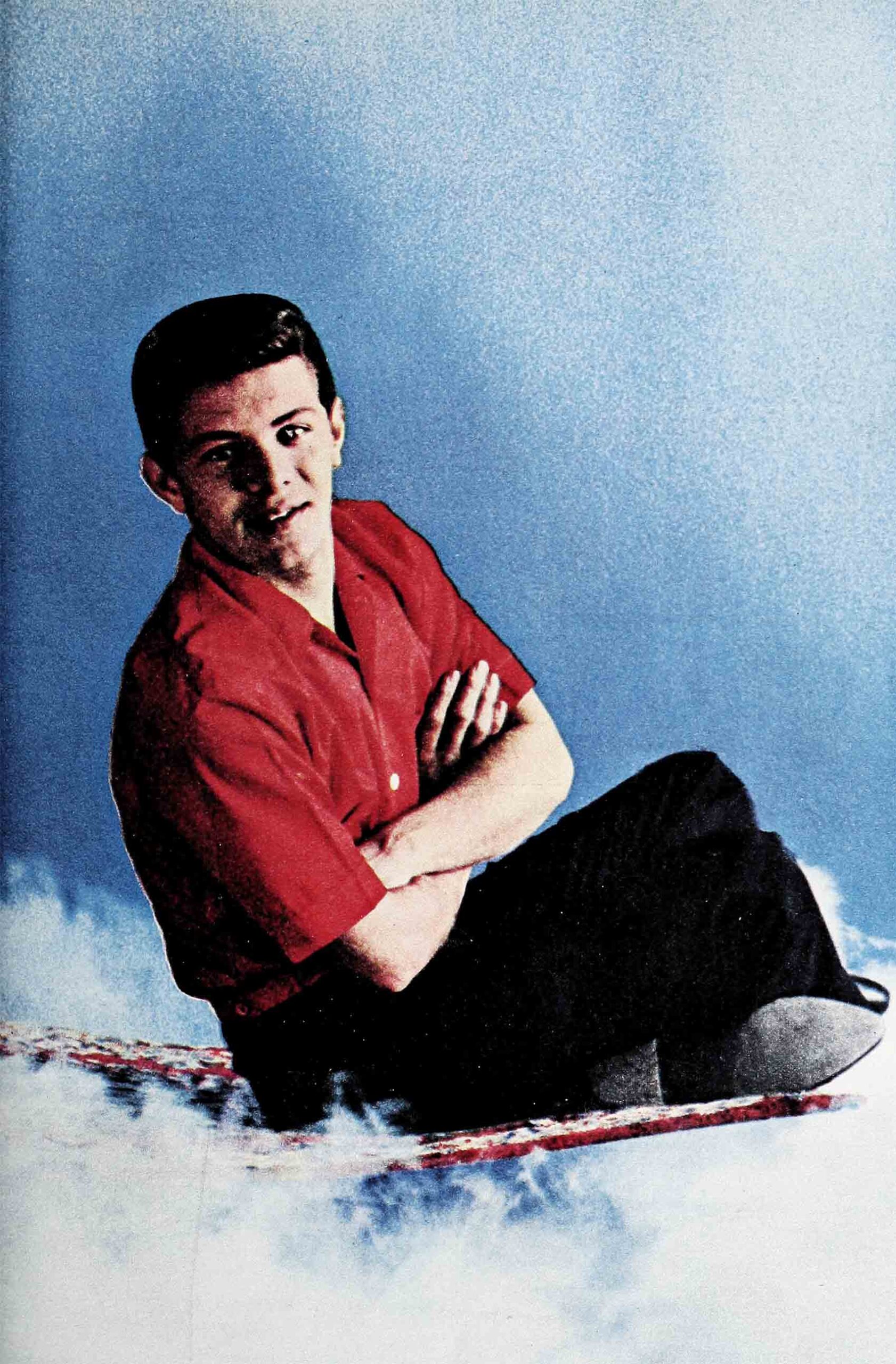
FRANKIE AVALON’S DREAM: “I never know where I am going, but I’m on my way to some strange destination. I’m always alone and very frightened because no one is around to guide me.
“When I’m on a train I’m only aware of an engineer—even though I can’t find him. When I’m on a plane I’m only aware of a pilot—even though I can’t see him. I feel so lonely that I want to cry. I look around hopefully for someone who can tell me where or when we’re going to stop. I never find such a person. I wake up before I literally go out of my mind.”
THEORY: Frankie’s dream is one of the easiest to analyze. Here we have an entertainer who is constantly going from one end of the world to the other on personal appearances. His working schedule is so crammed that he doesn’t have time to sit down and map out his future. He is worried about his destiny and relies upon his associates (or family) to guide him. Without them, he feels that he’s left alone to shift for himself. He wants responsibility, but believes that those who surround him can best advise him in this direction.
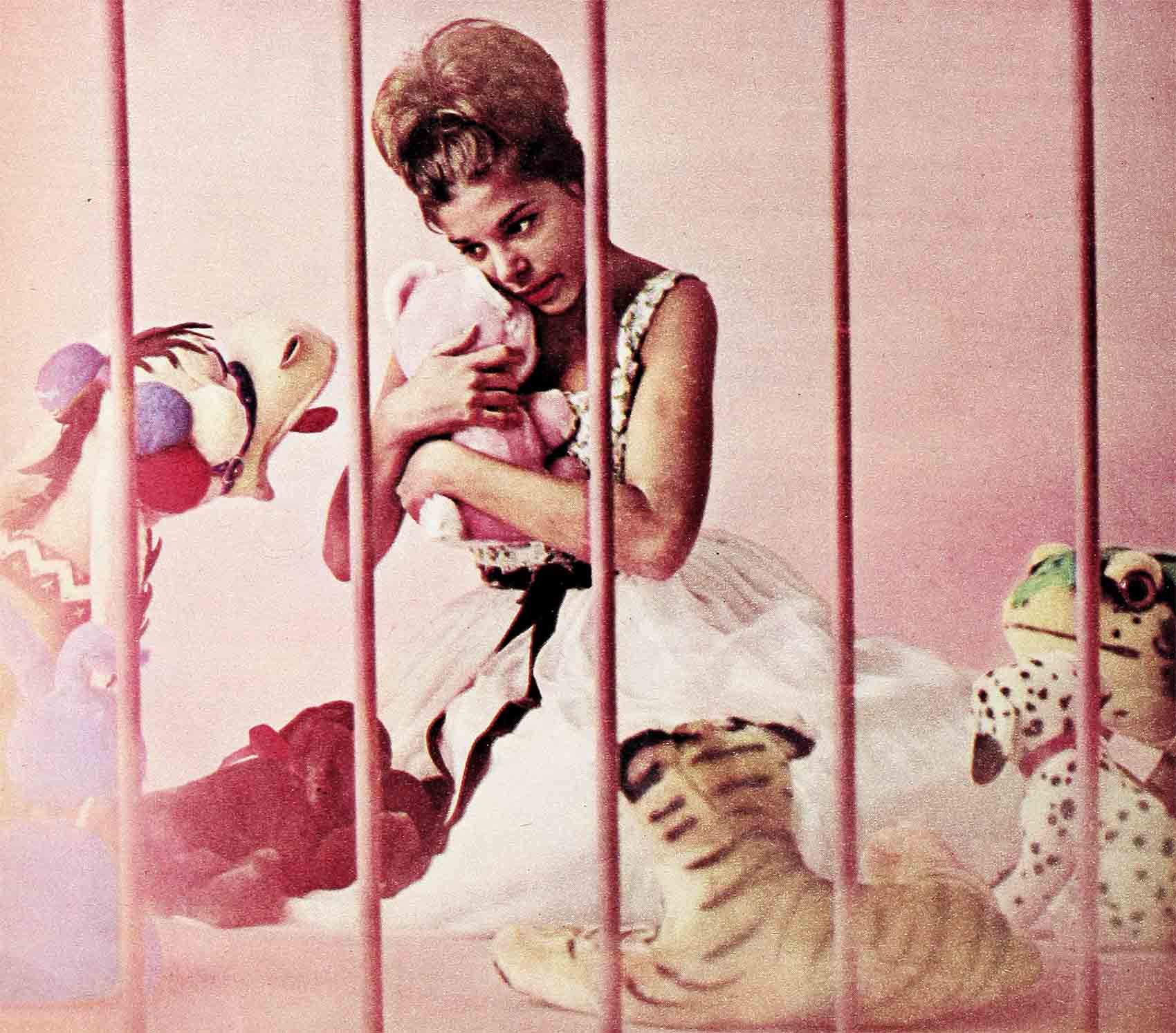
DODIE STEVENS’ DREAM: “For as long as I can remember, I have always dreamed about stuffed animals coming to life—long before I ever owned a real doll or stuffed animal of my own.
“The animals—sometimes there are only one or two and sometimes there are hundreds of them—remain their own size and I adopt them as pets. We play games like hide-and-seek, or go for picnics.
“Lately I recognize some of the animals from my own collection of stuffed toys—particularly my rabbit, two monkeys and two bears—and I seem to have a very close association with them. In the dreams I have the feeling that they are my only true friends.
“Several times I dreamed that a man in a black hood came to my house and took them all away and put them in the zoo. As he herded them into a gigantic truck, I screamed and hollered for him to stop. He paid no heed to me and slammed the truck door tight and put a massive lock on it.
“The scene then faded to the zoo where I visited all my animal friends with tears streaming down my face. All of the animals were crying, too, because we knew we would never be together again.”
THEORY: Sixteen-year-old Dodie Stevens is a teenager who is troubled over maintaining the friendships she has made throughout her life. She is so anxious, in fact, that she dreams of her stuffed animals coming to life to share day-by-day pleasures with her.
The toys symbolize Dodie’s love for others. They are so close to her that they take on the characteristics of real people in her dreams. Naturally, the ones she loves the most bring her the most happiness.
We can assume, therefore, that Dodie Stevens greatly misses the playmates and friends she grew up with. She wants to cling to those she loves because she feels the relationship may only be temporary. This is because she spends much time traveling. She is seeking “roots.”
BOB CONRAD’S DREAM: “I’m riding in a parade, in a flashy white convertible. The festivities are in my honor and I discover I’m riding down the streets of Chicago. The car goes down all the main boulevards and then turns off on Rush Street, which is a short avenue consisting mostly of night clubs.
“The driver of the car tells me that I can select one of these clubs—but only one—to try out my new night-club act. He tells me that this is my reward for taking the time to appear in the parade.
“Very slowly we go up and down the street. I get out of the car and go inside all the buildings to see what the stages look like. It is mid-afternoon and all of them are very bare and drab. They all begin to look exactly alike and I can’t decide which one I like best. The driver tells me that I have a time limit and the offer will be revoked if I don’t make up my mind.
“Just as I start to state my choice, he announces that my time is up. He pushes me out of the car and I land on the sidewalk in a crumpled position. I look up to see the car sprout wings and fly through the sky in a cloud of smoke. I holler for the man to return, but he fades out of sight as I awaken.”
THEORY: The hidden desire of Bob Conrad is certainly evident, without much searching, in his recurring dream which takes place in his native Chicago.
Here is an actor who wants to sing, just as he did in the old days, but he also wants to maintain his position of a well-known TV performer.
In his dream, his chance for a singing engagement comes as a reward—showing us a gentleman who believes that patience and good behavior will eventually lead him to his goal. When the opportunity comes, though, he misses out because of a time element. This indicates that Bob is torn between jumping into a musical career right away or waiting until a better situation presents itself in the future.
ROGER SMITH’S DREAM: “The setting is a California patio. The sun is shining brightly and I’m sitting at a table typing on a portable typewriter. I am nearing the finish of a manuscript.
“I’m on the last page and my wife Vici interrupts to bring me a cold drink. She leans over and kisses my forehead, reads the lines I have just completed, pats me on the shoulder in an encouraging manner and then goes back into the house.
“I resume typing at a very fast pace. The typewriter falls off the table and lands on my foot. The keys become alive—sort of like insects—and grab my ankle in a death-like grip. I try to shake them off but I can’t! When I feel as though the keys are going to seriously cripple me, I look down and find that the whole machine has turned to dust. A big wind suddenly blows up and sends the dust, as well as all the papers I’ve typed, sailing through the air and into an ocean which suddenly appears from nowhere.”
THEORY: Roger, who has written several scripts for Warner Brothers, worries about neglecting his wife for his writing.
His wife, who is his closest friend and severest critic, encourages him in his dream—but when she disappears and leaves him alone, the typewriter falls on his foot. He is punishing himself because he doesn’t like being separated from her. Physical harm doesn’t seem enough, so the typewriter turns to dust and his manuscript flies away. Thus, he is free to spend time with Vici again and forget about his writing for the time being.
DIANE McBAIN’S DREAM: “In my recurring dream the scene before me is taking place in a movie. A girl whose face I can’t see is walking along a crowded, cluttered street in downtown Los Angeles. She stops in front of a dingy shop, peers in the window and steps inside. Here she finds huge pieces of machinery which seem to be printing newspapers. She steps into a piece of the machinery and turns into a life-sized newspaper. The newspaper starts walking and then turns into torn strips which go sailing out the door, up and down sidewalks and among cars.
“I first had the dream when I was six years old. To this day, all my other dreams take place on a motion picture screen.”
THEORY: As soon as Diane was able to walk, she spent her afternoons going to the movies. This left a lifetime impression on her and she always dreams of activity taking place on the silver screen. She sees a girl, but doesn’t recognize the girl as herself because she lives in a world where she always wants to take on the personality of someone else. It is the dream of I a girl dedicated to being an actress.
In the dream the girl turns into a newspaper. Here Diane again wishes to be someone different from herself. As a newspaper no one recognizes her, so she can be on exhibit without worrying about personal implications. Thus, we probably have a shy girl by nature who can truly “blossom forth” only when she is pretending to be another person. Adopting the personalities of others, rather than using her own, enables her to show others her true inner values.
The locale of the dream is downtown Los Angeles—a place that has intrigued Diane since she started attending afternoon movies many years ago.
SAL MINEO’S DREAM: “I am backstage in a New York theater. I can’t identify the theater by sight, but it seems as if I’ve been there before.
“I turn on a light switch and see that the stage is set for Shakespeare’s ‘King Lear.’ Very quietly I slip into one of the dressing rooms and find makeup, costume and a beard. I then return to the stage and act out various scenes from the play. At first I am alone, but gradually the seats start filling with spectators and soon there are other actors present. As I am performing, I’m aware of a buzzing sound which encircles the audience. They are asking who is portraying King Lear, for his name is not listed on the program.
“The play ends and shouts of ‘Bravo!’ thunder throughout the theater—which now seems as large as Yankee Stadium. The actor who is made up as Kent approaches me. He lifts his hand to remove my beard so he can learn who I really am. This infuriates me and I run from the stage and into the streets of Manhattan. Passersby start laughing when they see me in costume, so I hide behind a newspaper stand. As I huddle in the corner it starts getting very cold and I fall asleep.”
THEORY: Sal thinks he has been in the theater before, so the setting is probably a flashback from his younger years when he starred in “The Rose Tattoo” or “The King and I” on Broadway.
In this theater he realizes his acting dream—to portray King Lear, an older man. His choice of character has a double meaning. First, he wants to prove himself a sincere, talented actor by appearing in a play by Shakespeare. Second, he wants to cancel out any thoughts that he is a young fly-by-night performer by taking on the role of an old man. The fact that he doesn’t want anyone to know who he really is confirms his need of being recognized as a true talent rather than a name on paper.
The people on the street laugh at Sal. Here again he feels that only the theater world can appreciate and understand his talents. He is definitely a boy dedicated to his craft.
It is interesting that the theater takes on the look of Yankee Stadium, as the Yankees have always been Sal’s favorite baseball team and at one time he wanted to be a professional ball player.
FABIAN’S DREAM: “My recurring dream takes place in high school in Philadelphia. Although I know the building well, I get lost on my way to math class. I always arrive late and then panic when I realize that I can’t find my text books. I have to leave the class to track them down. When I return with the books, I know that I am way behind in my work and that I won’t be able to complete the mid-term exam which is taking place.
“The room is filled with other students but I don’t recognize any of them because I am so intent on catching up with my work. I have a terrible fear of failing the course and I perspire as I’m hunched over the desk scribbling answers as fast as I can. At first the problems are very simple. Then they get harder and harder. Eventually a single problem takes up nine or ten pages of notebook paper and I know that I can’t possibly solve it. As I’m poring over this problem, the bell rings for the end of class. I hand in my paper, wondering if I have completed enough problems to warrant a passing grade. As I leave the room it seems as though the other students and the instructor sort of stare at me in mass movement. They shake their heads from side to side in mock pity. I then wake up—never knowing if I passed the test or not.”
THEORY: It is seldom, if ever, that a poor student dreams of failing exams, so Fabe should not be overly concerned.
The person who wishes to continue learning and worries about improving himself often dreams of failing old school tests. These dreams invariably take place the day before facing some important decision in life. It is a self-confidence gauge, disclosing a fellow who lacks confidence in himself even though he is well qualified for the task he is about to undertake. His biggest concern in life is living up to the standards he has set for himself.
Fabian’s teen years bear out this theory. He managed to maintain passing grades in school while carrying on a busy career. He intends to take night courses in math and English at a California college this fall.
THE END
—BY NANCY STREEBECK
It is a quote. PHOTOPLAY MAGAZINE NOVEMBER 1962




